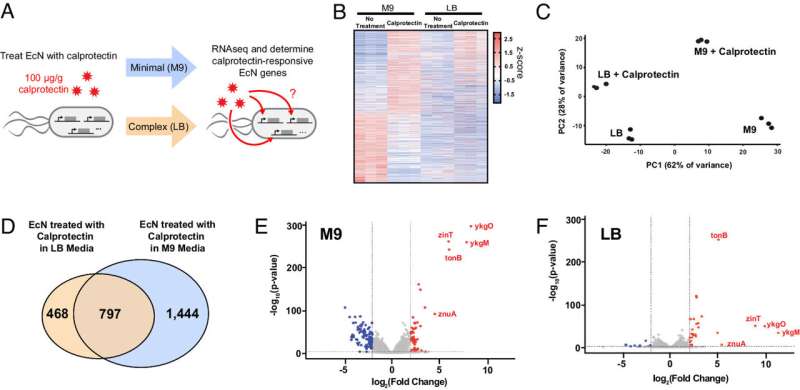This article has been reviewed according to Science X's editorial process and policies. Editors have highlighted the following attributes while ensuring the content's credibility:
fact-checked
peer-reviewed publication
trusted source
proofread
Engineered probiotic can 'sense' inflammatory bowel disease

Northwestern Medicine scientists have developed an engineered probiotic capable of detecting inflammatory bowel disease, according to a study published in the Proceedings of the National Academy of Sciences.
Inflammatory bowel disease, or IBD, is characterized by chronic inflammation of the gastrointestinal tract, which can result in persistent diarrhea, abdominal pain, weight loss and permanent damage to the digestive system. Roughly three million Americans live with inflammatory bowel disease, according to estimates from the Centers for Disease Control and Prevention.
Currently, IBD is monitored through invasive colonoscopy procedures and there's no way to know when an IBD flare-up will occur. This prompted investigators in the laboratory of Arthur Prindle, Ph.D., assistant professor of Biochemistry and Molecular Genetics and of Chemical and Biological Engineering, to explore synthetic biology approaches to detecting the disease.
"We now understand that the human body contains millions of microbiota, which are species of bacteria that are part of healthy, normal human biology," said Prindle, senior author of the study. "We wondered whether those very bacteria could be repurposed and re-engineered to actually sense biomarkers of disease as a way of monitoring and tracking inflammatory disease in humans."
In the study, investigators developed an engineered probiotic by taking the probiotic E. coli Nissle and adding a protein capable of sensing the presence of calprotectin, a known biomarker for IBD.
"The probiotic, this IBD diagnostic, works because we discovered a novel transcriptional response to the biomarker calprotectin, where the probiotic can sense calprotectin and change its gene expression and response," Prindle said. "Our sensor kind of piggybacks on that natural response, and then we use it to produce a measured output that we can detect that reports the presence of disease."
Prindle and his collaborators tested the engineered probiotic in mice with IBD and observed that the probiotic responded to the presence of IBD markers in real-time as it traveled through the gastrointestinal tract, according to the study. The results were confirmed using in vitro human tissues.
"There are several exciting implications from our study. One is actually the potential to use simple and low-cost means to detect and monitor diseases that are relevant to humans," Prindle said. "The current gold standard of IBD monitoring involves expensive, time-consuming and invasive means such as endoscopy or colonoscopy. What we hope to do is use probiotics as a less invasive and less costly readout of disease."
Moving forward, Prindle said he hopes to modify the probiotic so it can be tracked with human imaging, such as MRI or ultrasound. Additionally, the probiotic could have a therapeutic agent added to it so that it delivers medication when it senses IBD activity, Prindle said.
More information: Jonathan Y. Xia et al, Engineered calprotectin-sensing probiotics for IBD surveillance in humans, Proceedings of the National Academy of Sciences (2023). DOI: 10.1073/pnas.2221121120




















